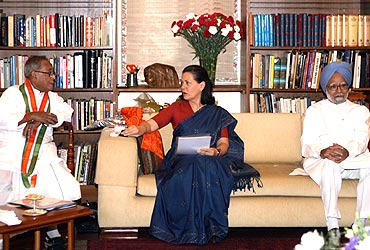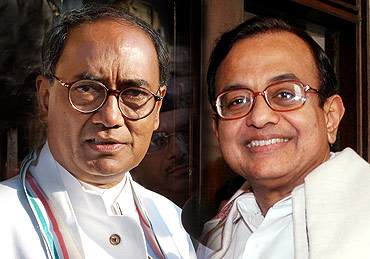Photographs: B Mathur/Reuters Neerja Chowdhury
There seems to be a free-for-all in the ruling party, with senior leaders publicly disagreeing with each other on policy issues, which is unusual for a party like the Congress.
First it was Digvijay Singh taking on Home Minister P Chidambaram as intellectually arrogant and critiquing the Chidambaram line on Maoism in a signed newspaper article. It kicked off dust in the Congress, and when it seemed to be settling down, the unruffled former Madhya Pradesh chief minister raked up the issue again by asserting that he stood by what he had written, and that what he had said reflected the Congress line. In other words, the Chidambaram line was at variance with Congress policy.
Singh defended his statement even after the gag order by the party -- seen as an enough is enough signal from Congress President Sonia Gandhi-- directing party leaders to stick to statements which concerned their area of responsibililty.
Earlier, the Cabinet Secretary had also issued a directive, obviously at the prime minister's instance, urging ministers to be restrained in their speech.
Last week saw a home ministry versus ministry of external affairs war, and what made it worse was that it involved another country, Pakistan. The timing of Home Secretary G K Pillai's statement to a newspaper that the ISI had been controlling and coordinating the Mumbai blasts, on the eve of the foreign minister's visit to Islamabad, put the fat in the fire.
Pakistan used Pillai's statement to scuttle the talks even before External Affairs Minister S M Krishna reached Islamabad.
This should have been clear to South Block mandarins when the Pakistan high commissioner in India received Krishna at the airport, and not the external minister's counterpart in Pakistan.
When Chidambaram had traveled to Pakistan only a couple of weeks earlier to meet his counterpart, he had been received by Pakistan Interior Minister Rehman Malik. The two ministers held a cordial meeting even though Chidambaram handed Malik a dossier which sought action against the three Inter Services Intelligence men David Headley had referred to in his deposition to the National Intelligence Agency team.
Meet the Hawks and Doves in the Congress
Image: India and Pakistan's Foreign Ministers S M Krishna and Shah Mehmood Qureshi in Islamabad, July 15Photographs: Adrees Latif/Reuters
S M Krishna did one better which only compounded the confusion. First, he did not react when his Pakistani counterpart Shah Mehmood Qureshi equated Pillai with Lashkar-e-Tayiba founder Mohammad Saeed.
On his return to India, he decided to come to Pillai's defence. And then he did yet another turnabout when he called the timing of Pillai's statement as unfortunate.
This came on his return from Afghanistan where American Secretary of State Hillary Clinton reportedly rapped the Indians on the knuckles, expressing unhappiness about the way Delhi had used Headley's disclosures for political purposes.
It is hard to imagine that Krishna, who owes his foreign ministership to Dr Manmohan Singh, would mount a public attack on Pillai without the prime minister's clearance.
In recent weeks, there have been other side shows going on, like the war of words between Highways Minister Kamal Nath and Planning Commission Deputy Chairperson Montek Singh Ahluwalia. Environment Minister Jairam Ramesh has locked horns with many ministers.
These statements go to show that the Congress has lowered its guard in the absence of a serious, viable and united Opposition despite the July 5 successful Bharat bandh against rising prices -- and that could be one explanation for the free display of opinions by its ministers, pursuing their own agendas.
The recent cacophony in the Congress also underscores the existence of hawks and doves inside the party on vital issues like countering the Maoist challenge or the timing and content of the dialogue with Pakistan.
Chidambaram and A K Antony are the hawks, Krishna is the dove, the prime minister the super dove, and Pranab Mukherji, the middle roader.
While this is neither surprising nor undesirable, the fact that senior leaders should give vent to their views publicly and speak with different voices even when it involves a neighbouring country shows that there has not been enough of a discussion within the party -- and the government -- to synthesise the varying views and evolve an agreed and viable policy, with different ministries being on the same page.
Meet the Wannabees
Image: Digvijay Singh and ChidambaramChidambaram is clearly emerging as a hawk, pursuing a tough line against the Maoists and Pakistan, a stance favoured by a large section of the Indian middle class. An underscoring of differences with other ministries reinforces the impression of a home minister who has his hands tied in very difficult circumstances.
Chidambaram is increasingly coming to occupy the right of centre space, catering to the sentiment of urban Indians, many of whom had viewed with favour or backed the Bharatiya Janata Party, particularly in North India.
Whenever there was discussion on Chidambaram as a possible prime ministerial candidate at a future date, his lack of familiarity with Hindi was seen as a big minus. Given that handicap, winning over urban North Indian, Hindu opinion would be the next best thing the home minister could hope for.
The other wannabe, Digvijay Singh, seems to be positioning himself in the left of centre mould, contra-distinct from the niche that Chidambaram is carving out for himself.
By espousing the cause of Muslims (the visit to the families of the Batla House accused in Azamgarh), tribals and poor (the Naxal problem cannot be handled with just a law and order approach), he is trying to come across as a representative of the old and traditional Congress line(representing upper castes, minorities and scheduled castes/scheduled tribes).
Digvijay Singh's political sanyas (Editor's note: Singh had declared he would not accept any ministerial office for ten years; this after he lost the Madhya Pradesh assembly election in 2003) ends in 2013 and he has already made it clear that he would be willing to contest an election to the Lok Sabha if his party were to give him a ticket.
It goes without saying that positioning by Congress leaders would have relevance if there was a vacancy at the top.
For some reason, the buzz in the party refuses to die down that Dr Manmohan Singh may throw in the gauntlet in 2012, either to walk into the sunset for health reasons or to move into Rashtrapati Bhavan as India's President.
Rahul Gandhi may decide not to take over the reins of power after the Uttar Pradesh assembly election even if the Congress does well. Or he may decide even in 2014 to play the role currently played by Sonia Gandhi, at least for some more time.
Both Chidambaram and Digvijay Singh are both realists enough to know that mere wishful thinking is not good enough. And yet at another level, politicians are incorrigible optimists and they are always preparing for multi-possibility options.
The Indian situation being what it is, anything can happen at any time.
Intended or otherwise, it is also a good way to counter the Opposition and retain and widen the Congress space.




article